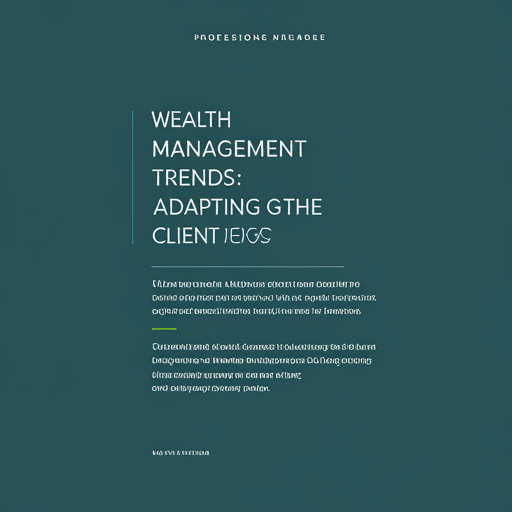Introduction to Wealth Management in the Cryptocurrency Era
The Evolution of Wealth Management
Wealth management has undergone significant transformation in recent years, particularly with the advent of cryptocurrency. Traditionally, wealth management focused on conventional assets such as stocks, bonds, and real estate. However, the emergence of digital currencies has introduced a hew asset class that requires a nuanced understanding of market dynamics. This shift has compelled financial advisors to expand their expertise to include blockchain technology and digital asset management. It is essential for professionals to stay informed about these developments.
Moreover, the integration of cryptocurrency into wealth management strategies allows for diversification and potential high returns. Investors are increasingly seeking exposure to digital assets as part of their portfolios. This trend reflects a broader acceptance of cryptocurrencies in mainstream finance. Many are still skeptical about digital currencies.
Furthermore, the regulatory landscape surrounding cryptocurrencies is evolving, necessitating a proactive approach from wealth managers. They must navigate compliance issues while providing sound investment advice. This complexity underscores the importance of continuous education in the field. Knowledge is power in finance.
In summary, the evolution of wealth management in the cryptocurrency era presents both challenges and opportunities. Financial professionals must adapt to these changes to meet their clients’ needs effectively. The future of wealth management is undoubtedly digital.
Impact of Cryptocurrency on Traditional Wealth Management
The rise of cryptocurrency has significantly influenced traditional wealth management practices. Financial advisors are now tasked with integrating digital assets into their clients’ portfolios. This integration requires a comprehensive understanding of both the benefits and risks associated with cryptocurrencies. Many investors are eager to explore new opportunities.
Additionally, the volatility of cryptocurrencies presents unique challenges for wealth managers. They must develop strategies that mitigate risks while capitalizing on potential gains. This balancing act is crucial for maintaining client trust and satisfaction. Risk management is essential in finance.
Moreover, the demand for transparency and security has increased as clients seek assurance in their investments. Wealth managers are now expected to provide detailed insights into the performance and security of digital assets. This shift has prompted the adoption of advanced technologies, such as blockchain, to enhance security measures. Technology is transforming finance.
Furthermore, regulatory considerations are comely more prominent in the wealth management landscape . Advisors must stay informed about evolving regulations to ensure compliance and protect their clients’ interests. Staying updated is vital for success. The impqct of cryptocurrency on traditional wealth management is profound and ongoing.
Importance of Adapting to Client Needs
In the evolving landscape of wealthiness management, adapting to client needs is paramount. Financial advisors must recognize the diverse preferences and risk tolerances of their clients. This understanding allows for the creation of tailored investment strategies. Personalization is key in finance.
To effectively address client needs, wealth managers can consider the following factors:
Additionally, regular communication is essential for maintaining client relationships. Advisors should provide updates on market trends and portfolio performance. This transparency fosters trust and engagement. Trust is crucial in finance.
Moreover, leveraging technology can enhance the client experience. Tools such as client portals and financial planning software can facilitate better interactions. These innovations streamline processes and improve accessibility. Technology is reshaping client engagement.
Ultimately, a proactive approach to understanding and adapting to client needs will lead to more effective wealth management practices. Client satisfaction drives success.
Current Trends in Wealth Management
Rise of Digital Assets
The rise of digital assets has transformed the wealth management landscape. Financial advisors are increasingly incorporating cryptocurrencies and blockchain-based investments into their portfolios. This shift reflects a growing acceptance of digital assets among investors. Many are eager to diversify their holdings.
Several kwy trends are emerging in this space:
Moreover, the demand for digital assets is driven by their potential for high returns. Historical data shows significant price appreciation in various cryptocurrencies. This potential attracts both retail and institutional investors. The allure of high returns is compelling.
Additionally, the integration of digital assets into traditional investment strategies is becoming more common. Wealth managers are developing hybrid portfolios that include both conventional and digital assets. This approach allows for greater flexibility and risk management. Flexibility is essential in today’s market.
As digital assets continue to rise, their impact on wealth management will only deepen. Staying informed is crucial for financial professionals.
Integration of Blockchain Technology
The integration of blockchain technology into wealth management is reshaping the industry. Financial professionals are increasingly recognizing the benefits of decentralized ledgers for enhancing transparency and security. This technology allows for real-time tracking of transactions, which can significantly reduce fraud. Fraud is a major concern in finance.
Moreover, blockchain facilitates the tokenization of assets, enabling fractional ownership. This innovation opens up investment opportunities for a broader range of clients. Many investors appreciate increased accessibility. Additionally, smart contracts streamline processes by automating transactions based on predefined conditions. Automation can save time and reduce errors.
Furthermore, the use of blockchain can enhance compliance and regulatory reporting. By providing an immutable record of transactions, it simplifies audits and ensures adherence to regulations. Compliance is critical in wealth management. Financial advisors are now better equipped to meet regulatory demands while maintaining client trust. Trust is essential for long-term relationships.
As blockchain technology continues to evolve, its applications in wealth management will expand. Staying updated on these developments is vital for financial professionals. Knowledge is key in this dynamic environment.
Focus on Sustainable and Ethical Investing
The focus on sustainable and ethical investing is gaining momentum in wealth management. Investors are increasingly prioritizing environmental, social, and governance (ESG) criteria when making investment decisions. This shift reflects a growing awareness of the impact of investments on society and the planet. Many seek to align their portfolios with their values.
Research indicates that companies with strong ESG practices often outperform their peers. This correlation suggests that sustainable investing can yield competitive financial returns. Performance matters in finance. Additionally, regulatory bodies are beginning to mandate greater transparency regarding ESG disclosures. This trend enhances accountability among companies. Transparency builds trust with investors.
Moreover, wealth managers are developing specialized funds that focus on sustainable investments. These funds often target sectors such as renewable energy, sustainable agriculture, and social impact initiatives. Investors are drawn to these opportunities. Furthermore, integrating ESG factors into investment analysis can mitigate risks associated with climate change and social unrest. Risk management is crucial for long-term success.
As the demand for sustainable and ethical investing continues to rise, wealth managers must adapt their strategies accordingly. Staying informed about ESG trends is essential. Knowledge empowers best investment decisions.
Client-Centric Approaches in Wealth Management
Understanding Client Demographics
Understanding client demographics is essential for effective wealth management. Financial advisors must analyze various factors, including age, income, and investment preferences. This analysis enables them to tailor their services to meet specific client needs. Personalization enhances client satisfaction.
Moreover, different demographic groups exhibit distinct financial behaviors. For instance, younger investors may prioritize growth and technology investments, while older clients often seek stability and income generation. Recognizing these differences allows advisors to create targeted investment strategies. Targeted strategies yield better results.
Additionally, cultural and social influences can shape clients’ financial goals and risk tolerance. Advisors should consider these factors when developing comprehensive financial plans. A holistic approach is vital for success. Furthermore, utilizing data analytics can provide deeper insights into client preferences and trends. Data-driven decisions are more effective.
By understanding client demographics, wealth managers can foster stronger relationships and improve client retention. Engaging clients through personalized communication and tailored solutions is crucial. Engagement builds loyalty and trust. As the financial landscape evolves, adapting to client demographics will remain a key component of successful wealth management.
Personalized Investment Strategies
Personalized investment strategies are essential in modern wealth management. Financial advisors must assess each client’s unique financial situation, goals, and risk tolerance. This tailored approach allows for the development of investment portfolios that align with individual preferences. Customization enhances client satisfaction.
Moreover, incorporating behavioral finance principles can improve investment outcomes. Understanding how clients make decisions helps advisors guide them effectively. Many clients struggle with emotional biases. Additionally, regular reviews and adjustments to investment strategies are crucial as market conditions and client circumstances change. Flexibility is vital in investment management.
Furthermore, utilizing advanced analytics and technology can enhance the personalization of investment strategies. Data-driven insights enable advisors to identify trends and opportunities that align with client goals. Technology is transforming the financial landscape. By leveraging these tools, advisors can provide more informed recommendations. Informed decisions lead to better results.
Ultimately, personalized investment strategies foster stronger client relationships and improve retention rates. Engaging clients through tailored communication and proactive management is essential. Engagement builds trust and loyalty. As the financial environment evolves, the importance of personalized strategies will continue to grow.
Enhancing Client Communication and Education
Enhancing client communication and education is vital in wealth management. Effective communication fosters trust and transparency between advisors and clients. When clients understand their investment strategies, they are more likely to remain engaged. Engagement leads to better outcomes.
Moreover, providing educational resources can empower clients to make informed decisions. Advisors shouod offer workshops, webinars, and informative materials tailored to client needs. Knowledge is a powerful tool. Additionally, utilizing technology can facilitate more effective communication. Digital platforms allow for real-time updates and easy access to information. Accessibility is crucial for client satisfaction.
Furthermore, regular check-ins and personalized communication can strengthen relationships. Advisors should proactively reach out to discuss market changes and portfolio performance. This approach demonstrates commitment to client success. Commitment builds loyalty.
By prioritizing communication and education, wealth managers can create a more client-centric experience. Clients who feel informed and valued are more likely to trust their advisors. Trust is essential for long-term partnerships. As the financial landscape evolves, enhancing communication and education will remain a key focus for successful wealth management.
Future Outlook: Preparing for the Next Wave
Emerging Technologies and Their Impact
Emerging technologies are reshaping the financial landscape, particularly in wealth management. Innovations such as artificial intelligence, machine learning, and blockchain are enhancing operational efficiency and client engagement. These technologies enable advisors to analyze vast amounts of data quickly. Speed is crucial in decision-making.
Moreover, AI-driven tools can provide personalized investment recommendations based on individual client profiles. This level of customization improves client satisfaction and retention. Additionally, blockchain technology enhances security and transparency in transactions, reducing the risk of fraud. Security is a top priority for investors.
Furthermore, robo-advisors are gaining traction, offering automated investment solutions at lower costs. This trend democratizes access to wealth management services, appealing to a broader audience. Accessibility is essential for growth. As these technologies evolve, wealth managers must accommodate their strategies to remain competitive. Staying ahead of technological advancements is vital.
By embracing emerging technologies, financial professionals can enhance their service offerings and improve client outcomes. Knowledge of these tools will be essential for future success. As the industry continues to evolve, the impact of technology will only increase.
Regulatory Changes and Compliance Challenges
Regulatory changes are significantly impacting the wealth management industry. Financial professionals must navigate an increasingly complex landscape of compliance requirements. These regulations often aim to enhance transparency and protect investors. Comoliance is essential for maintaining trust.
Moreover, the unveiling of new regulations can create challenges for wealth managers. Adapting to these changes requires ongoing education and training. Knowledge is crucial in this environment. Additionally, the rise of digital assets has prompted regulators to establish clearer guidelines. This development is necessary for fostering market stability. Stability is vital for investor confidence.
Furthermore, wealth managers must implement robust complianse frameworks to mitigate risks associated with regulatory breaches. This includes regular audits and monitoring of client transactions. Proactive measures can prevent costly penalties. Prevention is better than cure. As regulations continue to evolve, staying informed will be critical for financial professionals. Awareness is key to effective compliance.
By prioritizing regulatory compliance, wealth managers can enhance their credibility and protect their clients’ interests. Trust is built through transparency and accountability. As the regulatory landscape shifts, adapting to these changes will remain a top priority.
Building Resilience in Wealth Management Practices
Building resilience in wealth management practices is essential for navigating market volatility. Financial professionals must develop strategies that can withstand economic fluctuations. This involves diversifying investment portfolios to mitigate risks associated with specific asset classes. Diversification is a fundamental principle in investing.
Moreover, adopting a proactive approach to risk management can enhance resilience. Wealth managers should regularly assess potential threats and adjust their strategies accordingly. Regular assessments are crucial for effective management. Additionally, fostering strong client relationships can provide stability during turbulent times. Trusting relationships lead to better communication.
Furthermore, leveraging technology can improve operational efficiency and responsiveness. Tools such as data analytics and risk assessment software enable wealth managers to make informed decisions quickly. Informed decisions are more effective. By integrating these technologies, firms can enhance their adaptability to changing market conditions. Adaptability is vital for long-term success.
Ultimately, resilience in wealth management practices will be determined by a combination of strategic planning, client engagement, and technological integration. Financial professionals must remain vigilant and responsive to emerging challenges. Awareness is key in this dynamic environment.








